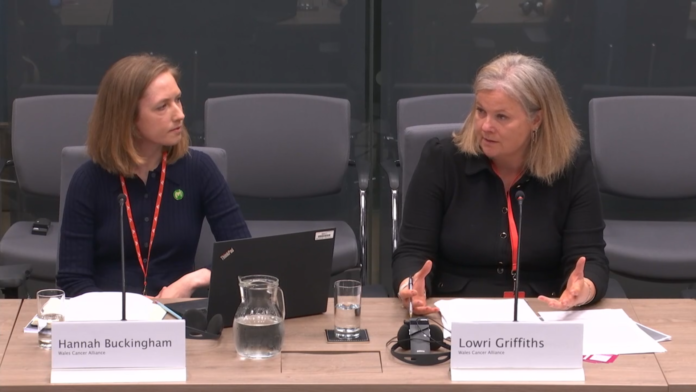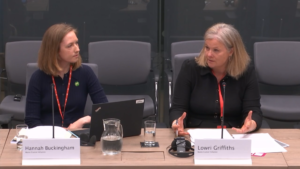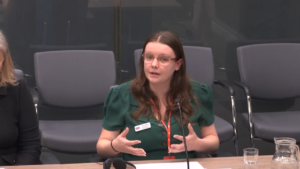Cancer charities joined forces to call for a longer-term national strategy to improve services after 9,000 people waited too long for treatment last year.
Mark Isherwood raised an Audit Wales report which found cancer services have consistently failed to hit a 75% target for patients to start treatment within 62 days.
Mr Isherwood, who chairs the Senedd’s public accounts committee, asked witnesses for their reflections on the issues identified by the auditor general for Wales.
Lowri Griffiths, chair of the Wales Cancer Alliance, a coalition of charities established nearly 20 years ago, said she was saddened and disappointed by the findings.
The director of policy at Tenovus told the committee: “We’ve long held the view that some of the governance arrangements around cancer services, especially since the development of the quality statement, have not been fit for purpose.”
‘Not good enough’
Hannah Buckingham, of Macmillan Cancer Support, a vice-chair of the alliance, said performance against the 62-day target shows the system cannot keep up with demand.
“It isn’t working for far too many people across Wales,” she told the committee, describing the impact of delays in diagnosis as devastating for cancer patients and their families. “Not just on their physical health but their mental and emotional health as well.”
Ms Buckingham said: “In 2024, we saw, for example, 9,000 people across Wales wait too long to start treatment on that 62-day pathway which is just not good enough quite frankly.”
She added that it is distressing for staff not being able to deliver timely care for patients, calling for a strategic approach to tackling workforce shortages.
Ms Buckingham warned of a lack of robust governance mechanisms to enforce, track and evaluate actions in the three-year NHS cancer improvement plan.
‘Profound impact’
Simon Scheeres, a fellow vice-chair of the alliance representing Cancer Research UK, said the report underlined the need for a longer-term, more cohesive strategy, raising concerns about a confusing plethora of quality statements, improvement plans and other initiatives.
Mr Scheeres pointed to Denmark as an example of best practice, with evidence showing countries with long-term cancer plans have seen greater improvements in outcomes.
Warning deprivation has a profound impact in Wales, he told Senedd members that death rates are 50% higher in the most deprived groups compared with the least.
Mr Scheeres said lung cancer is by far the biggest cancer killer in Wales as he raised a life-saving pilot of targeted lung health checks in the Cwm Taf Morgannwg health board.
Ms Griffiths voiced concerns about the Welsh Government’s response to the Audit Wales recommendation of a national lung screening programme which took “an age”.
‘Overlooked’
She said: “It talks about a decision to deliver – so [the] Welsh Government is not committing to deliver, it’s committed to making a decision to whether or not to deliver.”
Lauren Marks, of Young Lives vs Cancer, described the cancer improvement plan as lacking detail on the specific needs of children and young people.
“Systematically, children and young people are being overlooked in the detail,” she said.
Ms Marks warned the 62-day target, which measures the time between first being suspected of having cancer and starting treatment, does not capture young people’s experiences.
She said the delay that young people experience is between thinking something is wrong and getting their diagnosis, with most attending their GP more times than adults do.
‘Thank you’
Ms Marks added that children and young people get different types of cancer to adults that are not routinely addressed by screening programmes.
She highlighted travelling to treatment as a big issue for children and young people in Wales who travel longer distances than anywhere else in the UK to access care and support.
Ms Marks put the average cost of travel at £280 a month, with one in ten reporting missing or delaying treatment due to unaffordable transport.
Mr Isherwood, the committee chair who has long campaigned on disability rights, put on record his thanks for the work the charities do during the meeting on March 26.
“Two of my children when they were younger received diagnoses,” he said. “The first one, there wasn’t a referral to yourselves, now you’re in most hospitals…. with the second, it was Young Lives vs Cancer or CLIC Sargent that got my other daughter through, so thank you.”

| [donate]
| Help keep news FREE for our readersSupporting your local community newspaper/online news outlet is crucial now more than ever. If you believe in independent journalism,then consider making a valuable contribution by making a one-time or monthly donation. We operate in rural areas where providing unbiased news can be challenging. |



















